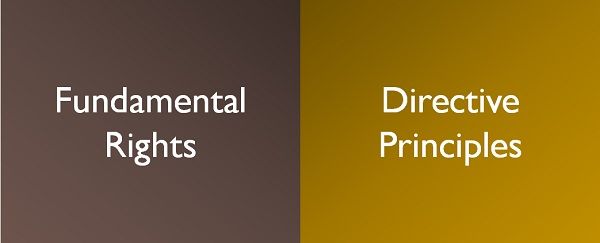

In the constitution, ‘Rights’ has a great role to play in the sustenance of the democracy. It allows the citizens to express their views, form political parties and participate in the political activities. It also safeguard the interest of minority people. Rights are nothing but the reasonable claims which are accepted by society and approved by the law. Fundamental rights are important for the very existence and development of the citizens.
Fundamental Rights are often compared and contrasted with the Directive Principles of the State Policy. These are the guidelines that are considered at the time of framing policies and making laws.
Take a read of this article to understand the difference between Fundamental Rights and Directive Principles.
| Basis for Comparison | Fundamental Rights | Directive Principles |
|---|---|---|
| Meaning | Fundamental Rights are the essential rights of all the citizens of the country. | Directive Principles are the guidelines which are referred while formulating policies and laws of the country. |
| Defined in | Part III of the Constitution | Part IV of the Constitution |
| Nature | Negative | Positive |
| Enforceability | They are legally enforceable | They are not legally enforceable |
| Democracy | It establishes political democracy. | It establishes social and economic democracy. |
| Legislation | Not required for its implementation. | Required for its implementation. |
| Promotes | Individual welfare | Social welfare |
Fundamental Rights are described as the basic rights guaranteed to every citizen of the country under the constitution, that helps in the proper and balanced development of personality. These are written in Part III of the Constitution which ensures civil liberty to all the citizens so that they can lead their lives peacefully. Moreover, they also prevent the State from intruding their freedom.
Fundamental Rights apply to all the citizens of the country equally, regardless of their race, caste, creed, sex, place of birth, religion, etc. Violation of the fundamental rights may lead to punishment under the Indian Penal Code (IPC), based on the discretion of the judiciary. At present, the Indian Constitution recognizes seven fundamental rights, they are:
As it is evident from the name, Directive Principles of State Policy are the instructions given to the central and state government of the country, so as to refer them while formulating the laws and policies, and to ensure a just society. The principles are embodied in Part IV and listed in article 36 to 51 of the constitution.
Directive Principles are non-justiciable, in the sense that they cannot be enforced in the court of law. However, these are recognized as important in the governance of the State. These principles aim at creating such a socio-economic environment, which can help the citizens to live a good life. Further, the directive principles also gauge the performance of government, concerning the objectives achieved by it.
The difference between fundamental rights and directive principles are discussed in the points given below:
In short, fundamental rights are essential rights awarded to the citizens by the government, to live life with equality, liberty and justice. Conversely, Directive Principles are nothing but the directions which are kept in mind by the government agencies while framing laws; even the judiciary has to consider them at the time of giving their verdict on the cases.